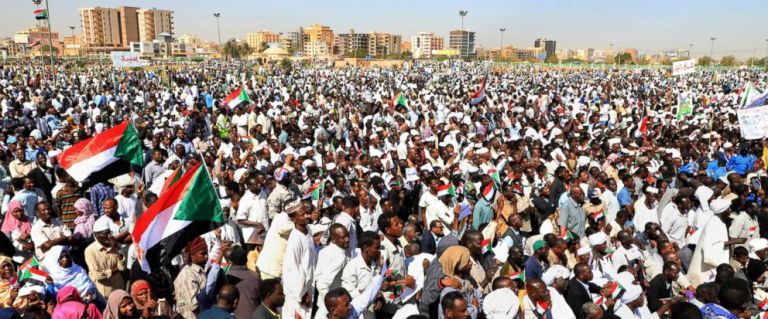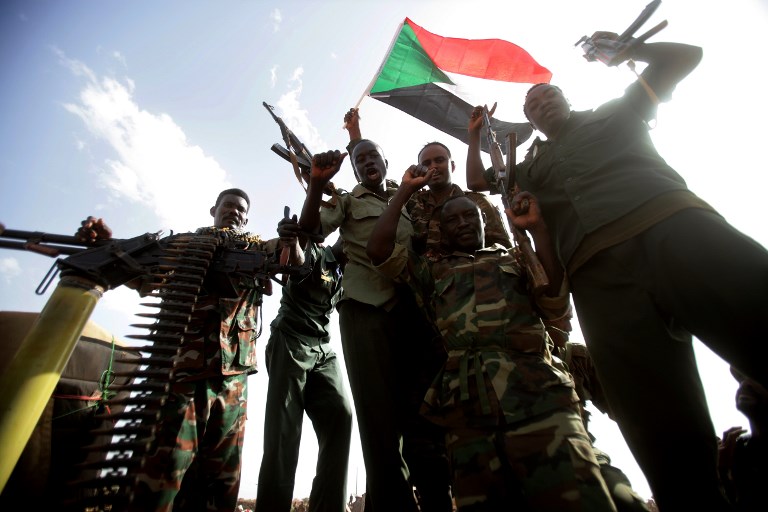An important and useful analysis of what might happen in the days ahead
“The exit of Bashir from power is just a matter of time and the current uprising seems to shorten the timing of such exist.”
Martin
Source: Radio Tamazug
By Dr. Luka Biong Deng Kuol

Sudan is one of the few African countries whose citizens pioneered post-independence popular uprisings in 1964 and 1985 that forced the ruling military regimes to step down. Popular uprising has become one of the political norms that Sudanese resort to in redefining their social contract with the state.
The current popular uprising is different from the previous ones in terms of drivers, intensity, popularity, duration, spread and death toll. Although this uprising was triggered by the decision of the government to lift subsidies on essential commodities, it is a manifestation of structural economic, political and social fragility of the state of Sudan. Unlike the previous uprisings, this uprising is engineered by the new forces of youth that are well informed, connected and equipped with enabling technology and social media that the regime is ill-equipped to contain.
The political Islam program adopted by the National Congress Party (NCP) in governing Sudan after regaining power through coup d’état in 1989 has not only resulted in the separation of South Sudan but has also caused enormous human suffering and agony that has contributed to this uprising and relegated Sudan to arguably one of the worst performing states in the world. This peaceful uprising has adopted a chant similar to that of the Arab Spring that “The people want to overthrow the regime” and calls for President Bashir to step down. The uprising seems to regain more strength and reenergize itself the more it is brutally repressed by the government.
There is no doubt the uprising has challenged and tainted the legitimacy of President Bashir and political Islam agenda in the Sudan. While many observers and particularly Sudanese activists see this uprising will eventually lead to the end of the regime of President Bashir, some realist observers see the contrary. It is likely the uprising will persist and continue unabated, while the government is determined to repress it until it is worn out.
Indeed, Sudan is at the crossroads as some observers see President Bashir as having no option but to fight back at any cost, while the protesters are determined to see regime change and the stepping down of President Bashir. If such confrontation continues, and despite the civility exhibited by the peaceful protesters, Sudan is destined for a bloody boiling point and chaos that may result in a scenario similar to that of Syria or Libya.
This uprising can only be quelled by the personal decision of President Bashir. This raises the real question of who is with Bashir and what options are available to him. The withdrawal of 22 political parties, including Islamist political parties, from the national dialogue initiated by President Bashir and their call for him to step down and form a sovereignty council and a transitional government is a political blow to the legitimacy of President Bashir.
Also many observers see that the army has shifted from its absolute allegiance to Bashir to a neutral position and are even siding in some instances with the protestors. The National Intelligence and Security Service (NISS) that has been very loyal to Bashir and has been an integral part of his ruling party, the NCP, has started blaming the government for its mismanagement of the economic crisis. That has also weakened the control of Bashir over the affairs of the government. Even the special military force called “The Rapid Support Force” that was formed to protect Bashir and his regime has taken a neutral position towards the uprising and its leadership has publicly criticized the government for the economic crisis even more than the opposition parties have done.
The political base of Bashir is also eroding, as NCP is divided and withering away from the political scene. Many credible reports have exposed NCP as a mere corrupt self-interest group. Bashir remains with only a few loyal supporters from his party who would like him to fight to the end. Besides the division within the NCP, there is also a friction among the regime’s supporters. The Sudanese Muslim Scholars Association, a body of state-sponsored clerics that is perceived as conservative and loyal to Bashir, has unprecedentedly criticized the government for the economic crisis that has resulted in the uprising and has called for the accountability of the officials responsible for the current economic crisis.
Real Options
Although many Sudanese activists and protesters see the only option available to Bashir is to step down, such option may be elusive. Bashir may indeed have other options. On the basis of my discussions with various Sudanese and non-Sudanese experts on Sudan, Bashir may resort to one of the following options:
- The first reasonable option is for Bashir to voluntarily resign and hand over power to the national army with a technocratic government to oversee the transition to constitutional democratic governance. President Bashir can either leave the country as did the former Tunisian president, Zine El Abidine Ben Ali, to another country that may ensure his safety and protection from the arrest of the International Criminal Court or decide to stay inside the country, as did the former Sudanese president, Ibrahim Abboud in 1964 and former Egyptian president, Hosni Mubarak. This option is unlikely as the national army is too weak and the protesters may not accept such option, as the current national army is a politicized army of the ruling party, the NCP. Some observers see this option as unlikely, as President Bashir turned down similar offers with lucrative guarantees.
- The second option is for President Bashir to declare not to contest for the presidency in general elections in 2020 and to allow the formation of an inclusive transitional government of national unity to oversee the transition to constitutional democratic governance. This option is likely to be accepted by President Bashir, but the protesters will not see it as an option as they are determined to see Bashir stepping down.
- The third option is for President Bashir to defy the uprising and declare a state of emergency to allow him to violently suppress it. Many observers see this as the most likely option, but it would most likely result in more bloodshed and may force the peaceful protesters to become violent, with some probably seeing the option of armed struggle as the only way to force President Bashir to step down. This scenario would be similar to that of Syria and Libya and would result in massive displacement and immense human suffering.
- The fourth option is for Bashir to publicly apologize to the Sudanese people for the atrocities committed during the uprising and bring to the book those who committed atrocities and are responsible for the killing of protestors. He might also call for a genuine and inclusive roundtable dialogue with a commitment that during this national dialogue he will relinquish his powers as president and become a ceremonial president.The aim would be to create a conducive political environment for genuine national dialogue and the formation of a transitional government with reduced powers and influence for the NCP. This would also ensure the participation of moderate Islamist members, as in the case of the Tunisian post-Arab Spring government. This option is likely to be entertained by Bashir and accepted by the protesters, if a trusted body facilitates it. However, the compromise of his continuing as a ceremonial president may not be acceptable in the current climate of extreme protests.
- The fifth option is for President Bashir to declare some cosmetic changes in his government by removing some of the radical Islamists and the trial of those who are accused of committing atrocities during the uprising and of corruption and initiate specific programs to address the anger of the youth. The protesters will certainly not accept this option, as they are determined to see Bashir step down.
The exit of Bashir from power is just a matter of time and the current uprising seems to shorten the timing of such exist.
The likely outcome of the aforementioned options depends on what can be done now to persuade Bashir to accept the option that would address his concerns and meet the demands of the protesters. The third option is likely to prevail, but may lead to more violence and chaos. Although it is difficult to know the psychology of Bashir, some observers describe him as arrogant and over-confident, with excessive traditional pride of the Ja’alin ethnic group and the Sudanese military officers.
These factors would not allow him to accept any option that will taint his pride. Some observers see Bashir as less concerned about ICC than he is about his pride, if he relinquishes power. This may be an overestimation of the level of resilience of Bashir as he may be concerned not to face the scary fate of the leaders ousted by the Arab Spring.
Unlike the former Tunisian president, Zine El Abidine Ben Ali, Bashir would be very concerned about ICC and would prepare to stay inside Sudan, if he were to step down. This may require the UN Security Council to request the ICC under Article 16 of the Rome Statute to defer the prosecution of President Bashir and offer him the incentive to step down voluntarily. Also, even if Bashir were to step down, the serious economic crisis faced by Sudan would not be easily resolvable. This will require enormous external development assistance from the international community to address the immediate survival needs of the protesters and the citizens.
The only body that may provide a trusted platform for dialogue between the protesters and the government is the African Union High-Level Implementation Panel headed by President Mbeki. The Panel under the leadership of President Mbeki will be able to find a consensual agreement as well as mobilize the necessary financial resources from the western countries and the Gulf States to rescue Sudan from its economic meltdown.
The fourth option may provide Sudan with a pathway for a peaceful transition to constitutional democratic governance.
The author, Dr. Luka Biong Deng Kuol, is a Global Fellow of Peace Research Institute in Oslo (PRIO).
Source=https://martinplaut.wordpress.com/2019/01/21/analysis-what-options-are-available-for-president-bashir-of-sudan/

 Eritrea is characterised by harsh climatic conditions, including cyclical drought, which affects groundwater resources, and flooding during rainy seasons. These events exacerbate the vulnerability of communities, making it difficult for families to fully recover from the effects of one emergency before being affected by another. In recent years, the country’s climatic conditions tested the coping capacities of the population, of which 80 per cent iare dependent on subsistence agriculture.
Eritrea is characterised by harsh climatic conditions, including cyclical drought, which affects groundwater resources, and flooding during rainy seasons. These events exacerbate the vulnerability of communities, making it difficult for families to fully recover from the effects of one emergency before being affected by another. In recent years, the country’s climatic conditions tested the coping capacities of the population, of which 80 per cent iare dependent on subsistence agriculture.




































